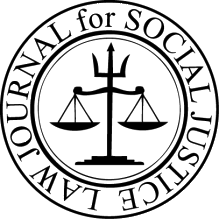Vol. XII, Fall 2019 Law Journal for Social Justice
Editor’s Note:
In keeping with our mission to foster important conversations about social justice issues, the Law Journal for Social Justice’s twelfth volume shares diverse voices and perspectives to discuss issues timely to our society. Volume twelve covers a broad spectrum of issues—from the alt-right’s use of media and the law to recruit individuals, to a critique of school disciplinary measures, to an analysis of the Voting Rights Act, to a historical perspective of punishment and the Eighth Amendment. Each article provides a critical understanding of an issue deeply rooted in our society in the hope readers also critically engage with these issues and act toward creating solutions.
Volume twelve begins with The Kids are Alt-Right: How the Media and the Law Enable White Supremacist Groups Recruit and Radicalize Emotionally Vulnerable Individuals. In this article, Eleanor Boatman explores the influential factors that contribute to rising violence among white supremacist groups. Boatman discusses ways the media and the law enable these groups to recruit and radicalize individuals. Boatman uses this exploration to discuss ways to prevent this rising violence. In an age where violence and mass shootings have become frequent to our society, Boatman’s critical perspective provides empowering solutions for advocates who seek to end this violence.
Next, Paul Davis critically analyzes the Voting Rights Act in The Root of the Problem: Enforcing the Voting Rights Act in Modern Settings. Davis argues preclearance in Section 3(c) of the Act is the best solution for addressing election discrimination, an issue relevant to our society today. Robert J. McWhirter and Jeremy L. Bogart in “Baby Don’t Be Cruel:” The Non-Retributive Eighth Amendment Versus Vengeful Victimsprovide a historical analysis of punishment and the Eighth Amendment to argue retribution was not the original goal of punishment. McWhirter and Bogart find punishment focused on pure retribution is actually not aligned with the original intent of the Eight Amendment.
Last, Jose Cruz Zavala-Garcia in The Battle Between Schools’ Disciplinary Measures and Students’ State Constitutional Right to an Education: A Discussion on School Discipline and a Call for Reformdiscusses how zero-tolerance and harsh disciplinary measures in schools have a significantly negative impact on minority students. Zavala-Garcia argues that harsh disciplinary measures can be challenged as a deprivation of constitutional rights. Zavala-Garcia concludes by proposing ways legislatures, school boards, and schools can reform their own disciplinary procedures to prevent disproportionate effects on minority students.
Ashley E. Fitzgibbons
Editor-in-Chief
2019-2020
